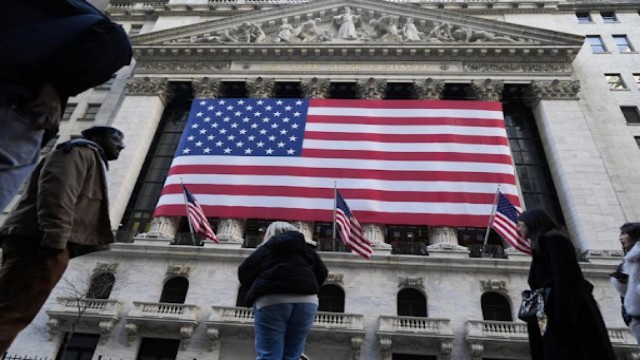
A U.S. flag hangs outside the New York Stock Exchange in New York on Monday, February 24, 2025. (AP Photo/Seth Wenig, File)
Wall Street plunged on Monday, with major stock indexes taking a steep fall as investors around the world grow uneasy about the direction of U.S. policy. Concerns over President Donald Trump’s trade moves and his ongoing criticism of the Federal Reserve have spooked markets, prompting many to move their money elsewhere.
The S&P 500 fell by 2.4%, marking a sharp 16% drop from its recent high just two months ago. The Dow Jones Industrial Average plummeted 971 points, or 2.5%, while the Nasdaq composite slid 2.6%, dragged down by major tech stocks like Tesla and Nvidia.
Adding to the worry, U.S. government bonds and the dollar, both typically seen as safe bets in uncertain times, also declined. This unusual pattern suggests that the turbulence in Washington is shaking long-standing investor confidence in America’s financial stability.
Trump’s aggressive stance on trade continues to fuel fears of a looming recession. Talks with Japan last week ended without a deal, raising doubts about future negotiations. Trump doubled down on his position via his Truth Social account, insisting that tariffs are essential and blasting critics as politically naive.
Meanwhile, tensions with China escalated. Beijing issued a warning to other nations, urging them not to strike trade agreements with the U.S. that could harm Chinese interests. China promised to retaliate if it feels sidelined.
The situation has been made worse by Trump’s increasing frustration with Federal Reserve Chair Jerome Powell. Trump has pushed for immediate interest rate cuts, calling Powell “Mr. Too Late” and claiming the U.S. economy is at risk unless rates are slashed soon.
The Fed has so far resisted sharp cuts, wary of triggering inflation. But speculation is rising that Trump might try to fire Powell—an action that could shake global markets even further. Investors fear that an undermined Fed would be less capable of managing inflation and maintaining economic balance.
Analysts from BlackRock say the uncertainty is so deep that investors may need to rethink how they build long-term portfolios. Traditional investing models that rely on stability and predictability are being tested.
Tech stocks led Monday’s downturn ahead of upcoming earnings reports. Tesla dropped 5.7%, continuing a sharp slide from its December high. Investors are wary of CEO Elon Musk’s growing political presence, which some believe is tarnishing the company’s image. Nvidia also tumbled, down 4.5%, after revealing that chip export limits to China could cost it $5.5 billion in the next quarter.
Almost every stock in the S&P 500 lost ground—92% of them, to be exact. A few exceptions stood out: Discover Financial and Capital One both rose after their merger was approved by U.S. regulators.
Gold, on the other hand, gained ground as investors turned to traditional safe havens. Treasury yields told a mixed story—short-term yields fell, hinting at possible rate cuts, while long-term yields rose due to concerns about America’s global economic credibility. The 10-year Treasury yield climbed to 4.40%, a noticeable jump from earlier in the month.
Meanwhile, the U.S. dollar weakened against several major currencies, including the euro and the yen, underscoring the growing lack of confidence in U.S. financial leadership.















